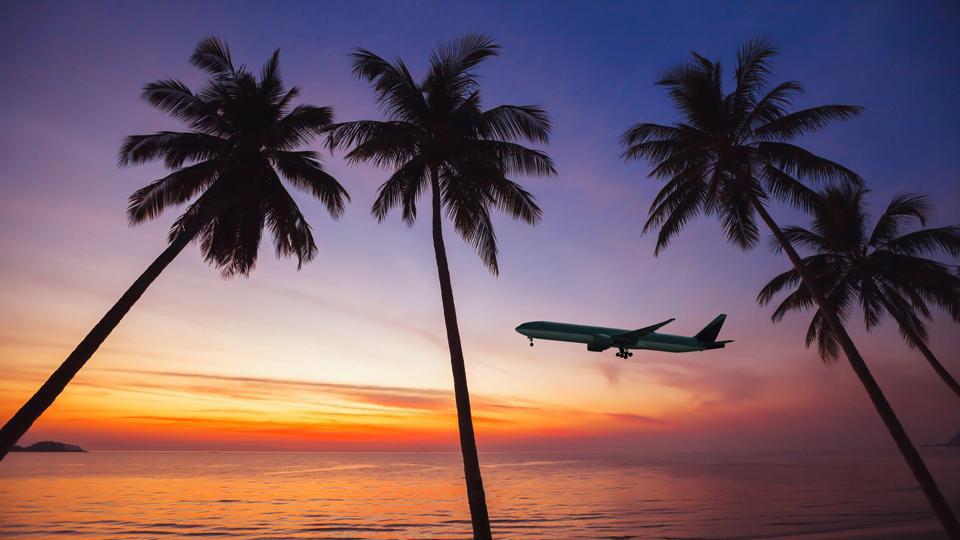Navigating Growth in the Travel Sector: Maximizing Revenue with Performance-Based Partnerships
The travel sector is ready for new growth in the coming years, with consumer behaviors suggesting investments in travel and experiences rather than “stuff”. As technology advances and accessibility reshapes the way people explore the world, travel and hospitality brands find themselves at the tipping point of this growth opportunity. Leveraging strategic performance-based affiliate partnerships and innovative marketing strategies will help drive revenue growth and market share in the years to come.
Let’s dive into the trajectory of the travel sector leading up to 2050, highlighting key trends and strategies for maximizing revenue through performance-based affiliate partnerships.

Industry Insights: The Evolution of Travel Revenue
Before diving into performance-based affiliate partnerships, let’s look at the trajectory of revenue growth in the travel sector. According to Bloomberg, projections suggest a healthy growth trajectory, with global travel and tourism revenue expected to exceed $15.5 trillion by 2033 and surpass $25 trillion by 2050.
You can find similar growth projections and insights from industry sources:
- World Travel & Tourism Council (WTTC)
- Deloitte Global Travel, Hospitality & Leisure Industry Outlook
- McKinsey & Company Travel & Tourism Reports
- United Nations World Tourism Organization (UNWTO) publications
- Industry reports from leading financial institutions such as Goldman Sachs, Morgan Stanley, or PricewaterhouseCoopers (PwC)
This forecasted growth is driven by several factors.
Variables Impacting Revenue Growth in Travel
What are the variables that are making travel more accessible and attractive to buyers? Let’s take a closer look:
- Availability of Commercial Flights: The widespread availability of commercial flights has revolutionized travel, making it faster, more accessible, and more affordable for millions of people worldwide.
- Rise of Mass Tourism: The introduction of package holidays and all-inclusive resorts has democratized travel, allowing individuals from various socioeconomic backgrounds to explore new destinations.
- Technological Advancements: Innovations such as online booking platforms, GPS navigation systems, and mobile apps have streamlined the travel experience, providing travelers with greater convenience and accessibility.
- Emergence of Sustainable Travel: Growing awareness of environmental issues has led to a rise in sustainable travel practices, with travelers seeking eco-friendly accommodations, carbon-neutral transportation options, and responsible tourism experiences.
- Shift towards Experiential Travel: Modern travelers increasingly prioritize unique experiences over material possessions, leading to a rise in experiential travel activities such as culinary tours, voluntourism, and immersive cultural experiences.
- Impact of Social Media: Platforms like Instagram, Meta and TikTok have transformed the way people research, plan, and share their travel experiences, influencing destination choices and shaping traveler expectations.
- Changing Demographics: The rise of the millennial and Gen Z traveler cohorts has brought about shifts in travel preferences, with younger generations seeking authentic, off-the-beaten-path experiences and valuing social connections and cultural immersion.
- Evolution of Accommodation Options: The sharing economy has disrupted traditional hospitality models, giving rise to alternative lodging options such as vacation rentals, homestays, and co-living spaces.
- Increased Connectivity: Advancements in telecommunications technology have facilitated seamless communication and connectivity while traveling, enabling travelers to stay connected with friends, family, and work obligations regardless of their location.
- Globalization of Travel: The world has become more interconnected than ever before, with globalization facilitating the exchange of ideas, cultures, and traditions, leading to a diversification of travel experiences and destinations.

Unlocking Growth with Performance-Based Affiliate Partnerships
In an increasingly digital landscape, travel brands have a unique opportunity to capitalize on performance-based affiliate partnerships to amplify their reach and drive revenue growth. Here are some key strategies and tips for maximizing the impact of affiliate marketing in the travel sector:
- Align with Leading Affiliate Networks: Partnering with top affiliate networks such as CJ Affiliate, Awin, and Rakuten Advertising provides access to a vast network of publishers and cutting-edge technology, enabling travel brands to reach their target audience effectively.
- Pay Attention to Data-Driven Insights: Leveraging analytics and data-driven insights allows travel brands to optimize affiliate campaigns, identify high-performing channels, and refine targeting strategies to maximize ROI.
- Embrace Experiential Marketing: Highlighting unique travel experiences and destinations resonates with travellers seeking immersive and authentic adventures, fostering engagement and loyalty.
- Prioritize Mobile Optimization: With mobile bookings projected to dominate the travel landscape, ensuring seamless mobile experiences is paramount for attracting and retaining customers.
- Champion Sustainability Initiatives: Demonstrating a commitment to sustainability and responsible tourism practices not only aligns with evolving consumer values but also differentiates travel brands in a competitive market.
- Diversify Your Partner Base: Cultivating relationships with a diverse range of performance-based affiliate partners, including influencers, content creators, and review sites, expands reach and enhances brand visibility across various audiences and platforms.
Examples of Performance-Based Partners in Travel
Here are some examples of how performance-based affiliate partners, such as content creators, Instagrammers, YouTubers, and bloggers, can drive bookings and transactions in the travel space:
Content Creator:
- A content creator could produce high-quality videos or articles showcasing their travel experiences at various destinations.
- They could include affiliate links within their content to hotels, airlines, travel agencies, or booking platforms.
- By sharing engaging and informative content, they can attract an audience interested in similar travel experiences and encourage them to book through their affiliate links.
Instagrammer:
- An Instagrammer with a large following could post visually appealing photos and stories of their travels to different destinations.
- They could use captions to describe their experiences and recommend specific hotels, restaurants, or activities.
- Including affiliate links in their bio or using the swipe-up feature in Instagram Stories can direct followers to booking platforms or travel agencies, generating commissions for each booking made through their referral.
YouTubers:
- A YouTuber specializing in travel vlogs could create videos documenting their journeys, offering tips and recommendations along the way.
- They could collaborate with hotels, tour operators, or travel brands to feature their services in their videos.
- By including affiliate links in video descriptions or using sponsored annotations, they can drive viewers to book accommodations, tours, or flights through their affiliate partners.
Bloggers:
- A travel blogger could write detailed guides, itineraries, and reviews of destinations, hotels, and attractions.
- They could optimize their blog posts for search engines to attract organic traffic from users searching for travel-related information.
- By strategically placing affiliate links within their blog posts, they can earn commissions from readers who click through and make bookings based on their recommendations.

In each of these examples, the performance-based affiliate partners leverage their platform and audience to promote travel-related products and services, earning commissions for driving bookings and transactions. Their role as trusted influencers with engaged audiences allows them to provide valuable recommendations and guidance to their followers, influencing their purchasing decisions in the travel space.
Case Study: Extended Stay America Leverages Performance-Based Partners to Reach New Audiences
Extended Stay America (ESA) stands out as a perfect example of how affiliate marketing can drive both growth and differentiation in the travel industry. By aligning its affiliate program with core values like affordability, convenience, and outstanding service, ESA effectively appeals to travellers seeking value-oriented accommodations for extended stays. This thoughtful alignment not only contributes to revenue growth but also cultivates brand loyalty and enhances customer satisfaction, ultimately distinguishing ESA in a competitive market.
Through close collaboration with their affiliate marketing agency and their performance-based affiliate partners, ESA amplifies its message and resonates with both current and prospective guests. Notably, during the COVID-19 pandemic, ESA continued to advocate for travellers and individuals displaced by the crisis, earning global recognition and guest loyalty for its proactive support and accessibility to both travellers and locals in need. They provided a safe, clean and affordable long-term place to stay, and they partnered with affiliates to spread this message and drive awareness of their offerings. This consistent commitment to delivering value and accessibility underscores ESA’s dedication to meeting the evolving needs of its guests, further solidifying its position as a trusted hospitality leader in the United States.

Values That Performance-Based Partners Can Get Behind
ESA worked closely with their performance-based affiliate partners to communicate their value proposition to potential guests:
- Affordability: ESA emphasizes affordability without compromising on quality, offering guests spacious suites with fully equipped kitchens at competitive rates.
- Extended Stay Focus: As the name suggests, ESA caters specifically to guests seeking accommodations for longer durations, providing amenities and services tailored to extended stays.
- Exceptional Service: ESA prides itself on delivering exceptional customer service, with a dedicated staff focused on meeting the unique needs of long-term guests.
- Convenience: ESA locations are strategically situated near business districts, airports, and major attractions, offering guests convenience and accessibility during their stay.
- Brand Consistency: ESA maintains consistency across its properties, ensuring guests receive the same level of comfort and service regardless of location.
- Pet-Friendly Policy: ESA welcomes pets, catering to travellers who wish to bring their furry companions along for an extended stay.
- Commitment to Cleanliness: ESA prioritizes cleanliness and hygiene, implementing rigorous cleaning protocols to ensure a safe and comfortable environment for guests.
- Flexibility: ESA offers flexible booking options and extended cancellation policies, providing guests with peace of mind and flexibility in their travel plans.
These are just a few factors that contribute to ESA’s unique positioning in the market, and their success during a time when many other brands and hoteliers were shutting down, setting them apart from competitors and appealing to both travellers and affiliates seeking affordable, convenient, and comfortable accommodations for extended stays both during and after the pandemic.
Navigating Future Success in the Travel Sector
As travel brands continue to navigate the evolving landscape of the travel sector, staying attuned to emerging trends and consumer preferences, such as “Vibe Accommodation Descriptions” and “Destination Doups” is critical. The video below released by Expedia, highlights examples of these trends becoming more the norm today and into the future.
By leaning into performance-based partnerships and adopting flexible and brand-aligned marketing strategies with these partners, travel brands can position themselves for success in the years to come.
Where is New Growth Coming From?
With a focus on personalization, sustainability, and immersive experiences, travel brands can differentiate their offerings. They can capture the attention of discerning travellers, especially Millennials and Gen Zs, driving revenue growth well into the future.
Additionally, because Millennials and Gen Zs represent a growing group of consumers with diverse demographic cohorts with distinct characteristics and preferences, brands should spend time understanding and paying special attention to these buyer groups. Performance-based affiliate partnerships can help with that.
Millennials, born between 1981 and 1996, value experiences, work-life balance, and career fulfillment. Generation Z, born from the mid-1990s to early 2010s, prioritize authenticity, personalization, and social impact.
Millennials and Gen Zs have reshaped industries like travel and tourism, favoring unique, immersive experiences. They prioritize cultural authenticity, sustainability, and ethics. Their influence fuels trends like experiential and solo travel, eco-friendly accommodations. As these generations mature, their preferences will continue to shape the travel industry.
In Conclusion
In conclusion, as the travel industry continues to expand and evolve, performance-based partnerships emerge as a smart strategy for sustained growth. Leveraging the power of affiliates, content creators, and influencers allows travel brands to tap into diverse audiences, drive bookings, and increase revenue without significant upfront costs. These partnerships enable brands to reach consumers at various stages of the purchasing journey, from inspiration to booking, leveraging the trust and credibility established by their partners.
As the industry embraces technological advancements and shifts in consumer behavior, performance-based partnerships offer a flexible and scalable approach to marketing. By leveraging the collective influence and reach of performance-based affiliate partners, businesses in the travel sector can navigate the challenges and opportunities ahead, driving growth and success in the years to come.

